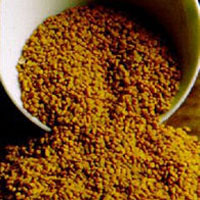Penn Herb Wellness Guide
FenugreekFind Products
 © Steven Foster
© Steven FosterParts Used & Where Grown
Although originally from southeastern Europe and western Asia, fenugreek grows today in many parts of the world, including India, northern Africa, and the United States. The seeds of fenugreek are used medicinally.
- Reliable and relatively consistent scientific data showing a substantial health benefit.
- Contradictory, insufficient, or preliminary studies suggesting a health benefit or minimal health benefit.
- For an herb, supported by traditional use but minimal or no scientific evidence. For a supplement,little scientific support.
Our proprietary “Star-Rating” system was developed to help you easily understand the amount of scientific support behind each supplement in relation to a specific health condition. While there is no way to predict whether a vitamin, mineral, or herb will successfully treat or prevent associated health conditions, our unique ratings tell you how well these supplements are understood by the medical community, and whether studies have found them to be effective for other people.
For over a decade, our team has combed through thousands of research articles published in reputable journals. To help you make educated decisions, and to better understand controversial or confusing supplements, our medical experts have digested the science into these three easy-to-follow ratings. We hope this provides you with a helpful resource to make informed decisions towards your health and well-being.
This supplement has been used in connection with the following health conditions:
| Used for | Amount | Why |
|---|---|---|
High Cholesterol | 10 to 30 grams two to three times per day | Fenugreek seed powder has been found to substantially lower blood levels of total and LDL-cholesterol. |
Type 2 Diabetes | 5 grams or more daily | Fenugreek seeds appears to lower blood glucose levels by slowing down carbohydrate digestion and absorption. |
High Triglycerides | 100 grams seed daily or 25 to 50 grams defatted seed powder daily | Fenugreek has been shown to lower total and LDL cholesterol and triglyceride levels in people with high lipid levels in preliminary trials.. |
Type 1 Diabetes | 3 tablespoons of fenugreek powder with each meal | Fenugreek seeds are high in soluble fiber, which helps lower blood sugar by slowing down carbohydrate digestion and absorption. |
Constipation | Refer to label instructions | Fenugreek is a mild bulk-forming laxative that’s best suited for long-term use in people with constipation. |
Traditional Use (May Not Be Supported by Scientific Studies)
A wide range of uses were found for fenugreek in ancient times. Medicinally it was used for the treatment of wounds, abscesses, arthritis, bronchitis, and digestive problems. Traditional Chinese herbalists used it for kidney problems and conditions affecting the male reproductive tract.1 Fenugreek was, and remains, a food and a spice commonly eaten in many parts of the world.
Copyright 2025 TraceGains, Inc. All rights reserved.
Learn more about TraceGains, the company.
The information presented by TraceGains is for informational purposes only. It is based on scientific studies (human, animal, or in vitro), clinical experience, or traditional usage as cited in each article. The results reported may not necessarily occur in all individuals. Self-treatment is not recommended for life-threatening conditions that require medical treatment under a doctor's care. For many of the conditions discussed, treatment with prescription or over the counter medication is also available. Consult your doctor, practitioner, and/or pharmacist for any health problem and before using any supplements or before making any changes in prescribed medications. Information expires December 2025.


